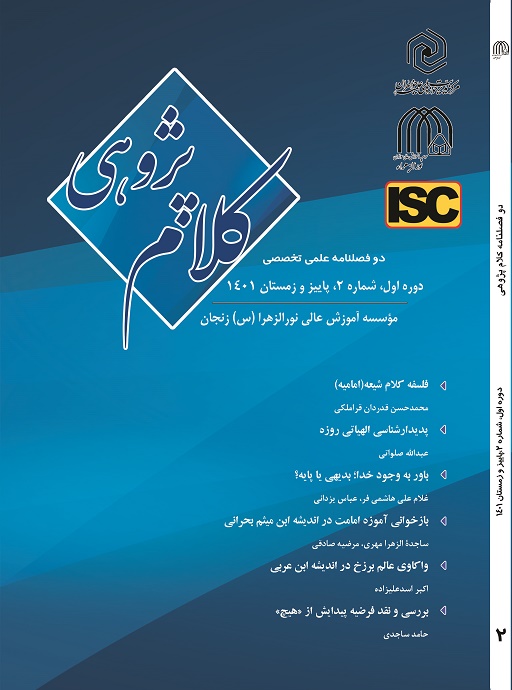نوع مقاله : مقاله پژوهشی
نویسنده
فلسفه و معارف اسلامی/ علوم انسانی و هنر/ دانشگاه آزاد اسلامی واحد زنجان/ زنجان/ ایران
چکیده
خداوند در ادیان توحیدی با صفات متعددی از جمله علم، اراده، خالق بودن و معبود بودن توصیف میشودکه حاکی از یک خدای شخصوار است. چنین توصیفهایی در منابع اسلامی نیز به کرّات آمده است. در این میان کتاب توحید کافی یکی از اصیلترین منابع برای داشتن مفهوم و تصویری از خداوند است که توسط معصومان (ع) ارائه میشود. آنچه این نوشتار مدنظر دارد پرداختن به این پرسش است که با توجه به روایات موجود در کتاب توحید کافی و با درنظر گرفتن صفات خداوند در این روایات چگونه میتوان دربارهی شخصوارگی خدا سخن گفت؟ برای تبیین پاسخ به این پرسش با روش تحلیل محتوا به بررسی روایات این کتاب پرداخته شده است. آنچه این بررسی نشان میدهد این است که اگرچه در روایات مذکور از صفات سازنده مفهوم شخص همچون خالق بودن، علم، شنوا و بینا بودن و همچنین از اموری همچون بداء سخن میرود، اما بیان سلبی و تنزیهی در روایات بسیار بیش از بیان ایجابی و اخباری دربارهی خداوند است. نهایتاً اینکه با توجه به تأکید بر تنزیه خداوند در روایات، شناخت تصوری از خداوند تنها با واسطه و از طریق آیات و نشانهها ممکن است.
کلیدواژهها
عنوان مقاله [English]
Abstraction and Personality of God from the perspective of the narrations of the book of “Al-Kafi, Kitāb at-tawḥīd”
نویسنده [English]
- zahra ramezanlu
philosophy & Islamic study/ art & humanities/ Azad university/ Zanjan
چکیده [English]
In monotheistic religions, God Is described with many attributes including knowledge, will, the creator, and idol which indicates God as a “Personal-God”. Such descriptions also have been repeated many times in Islamic sources. In the meantime, for having a concept and imagination of God, the book of “Al-Kafi, Kitāb at-tawḥīd” is one of the most unfeigned sources, which is presented by The Infallibles. What this article intends to address is the question of whether it is possible to talk about the personality of God, according to the narrations of the book of “Al-Kafi” and the attributes of God in them. The narrations of this book have been studied by the descriptive-analytics method to explain the answer to this question. This study of the mentioned narrations shows that although the constructive attributes such as being the creator, hearer, and insightful and things like Bada’ are mentioned, negative and purifying expressions about God are much more than positive and predictive expressions. Finally, according to the purification of God in the narrations, it is considered impossible to know the concept of God except through intermediaries and through verses and signs.
کلیدواژهها [English]
- Al-Kafi
- Kitāb at-tawḥīd
- personal
- selfhood
- Divine Attributes

